Organizational Behavior Report: BTEC Business Module Analysis
VerifiedAdded on 2023/01/06
|10
|2834
|41
Report
AI Summary
This report provides an in-depth analysis of organizational behavior, using Tesco plc as a case study. It explores the impact of culture, politics, and power on individual and team performance, referencing Hofstede's cultural dimensions model to assess Tesco's organizational culture, including power distance, individualism, and masculinity. The report also examines the influence of organizational power, utilizing the French and Raven model to evaluate referent, legitimate, coercive, reward, and expert power within Tesco. Furthermore, it delves into organizational politics and its effects on the company. The second part of the report focuses on motivation theories, differentiating between content and process theories. It analyzes Adam's Equity Model and Vroom's Expectancy Theory within the context of Tesco's operations, and also considers Herzberg's Two-Factor Theory. The report aims to provide insights into how these concepts impact employee behavior and organizational success.
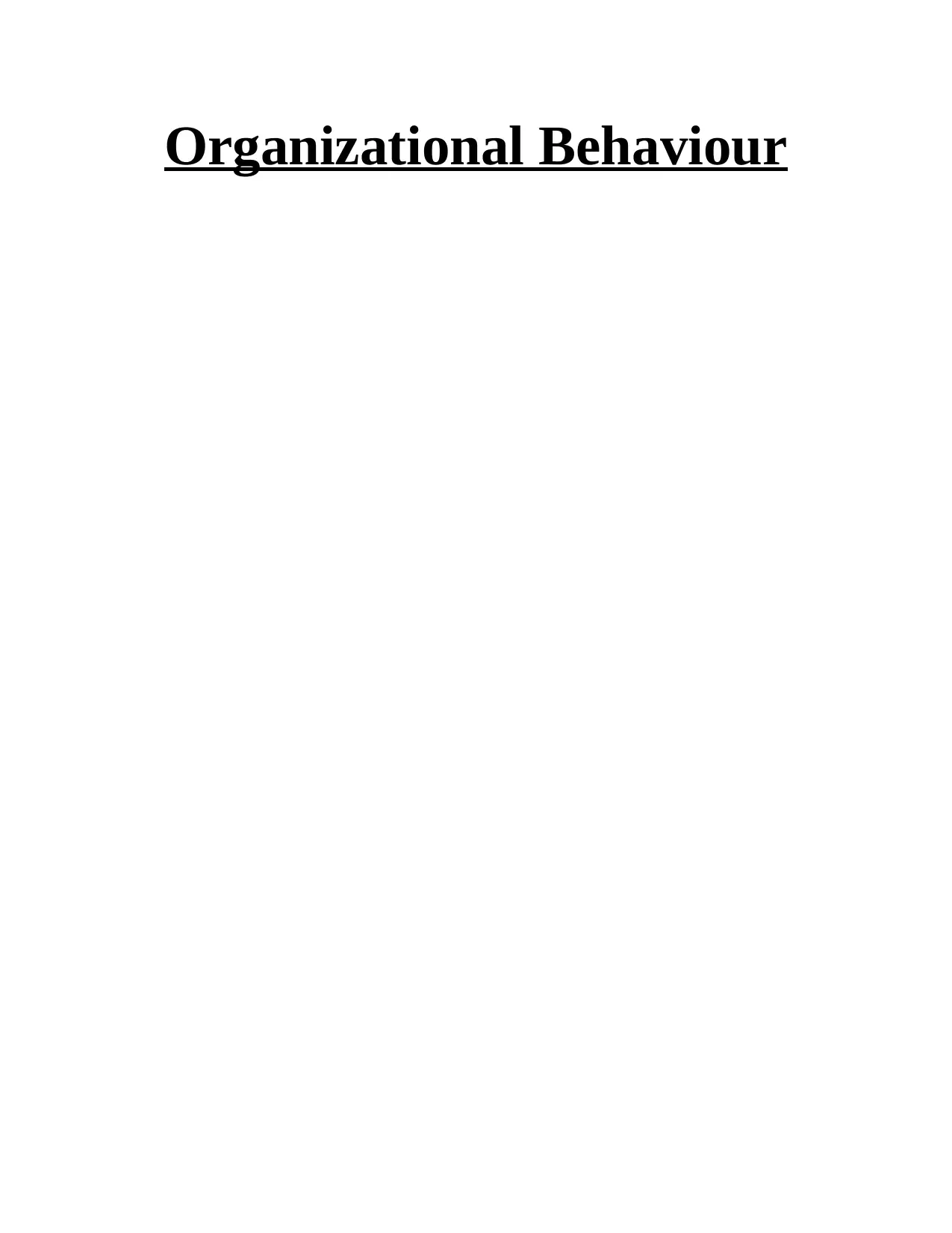
Organizational Behaviour
Paraphrase This Document
Need a fresh take? Get an instant paraphrase of this document with our AI Paraphraser
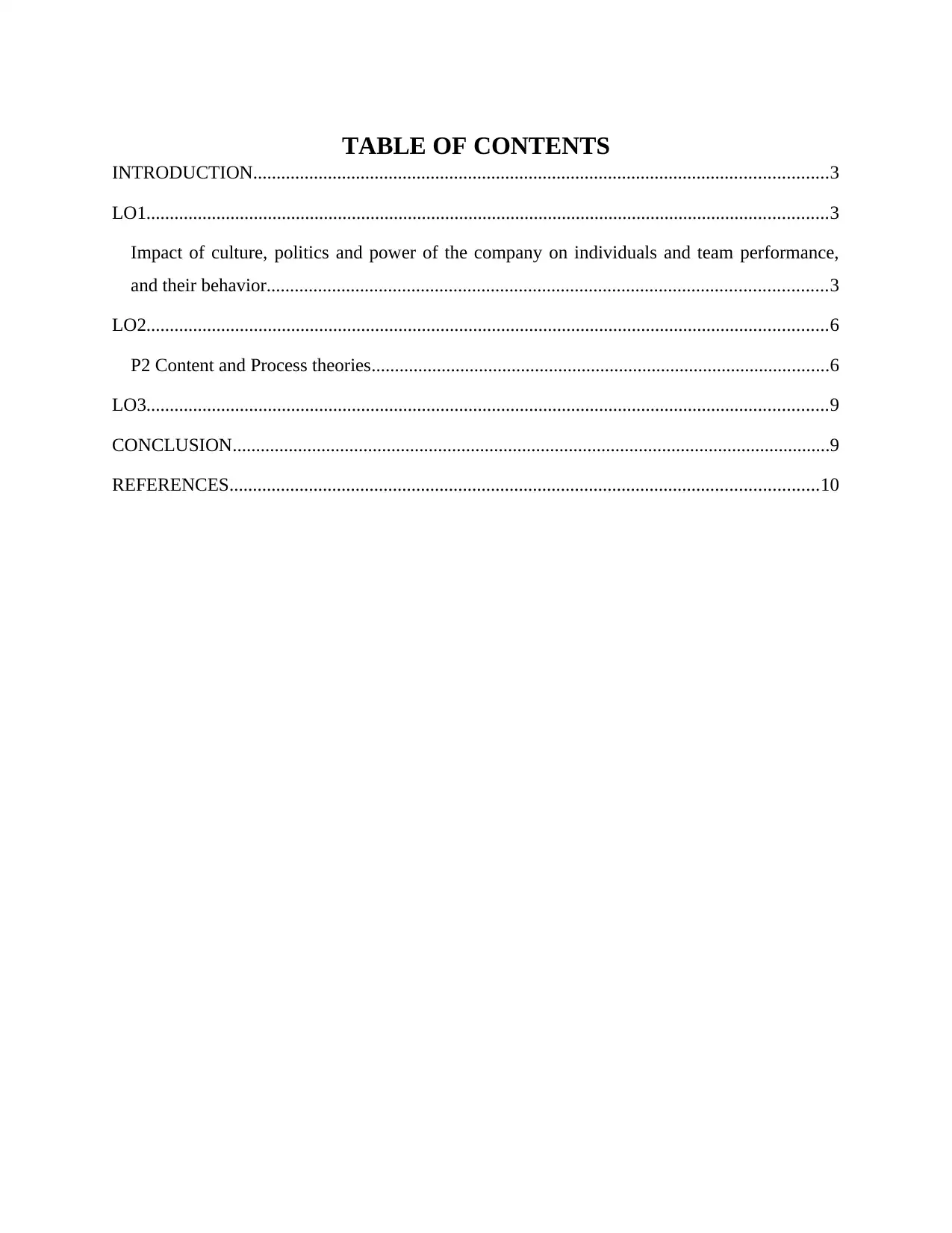
TABLE OF CONTENTS
INTRODUCTION...........................................................................................................................3
LO1..................................................................................................................................................3
Impact of culture, politics and power of the company on individuals and team performance,
and their behavior........................................................................................................................3
LO2..................................................................................................................................................6
P2 Content and Process theories..................................................................................................6
LO3..................................................................................................................................................9
CONCLUSION................................................................................................................................9
REFERENCES..............................................................................................................................10
INTRODUCTION...........................................................................................................................3
LO1..................................................................................................................................................3
Impact of culture, politics and power of the company on individuals and team performance,
and their behavior........................................................................................................................3
LO2..................................................................................................................................................6
P2 Content and Process theories..................................................................................................6
LO3..................................................................................................................................................9
CONCLUSION................................................................................................................................9
REFERENCES..............................................................................................................................10
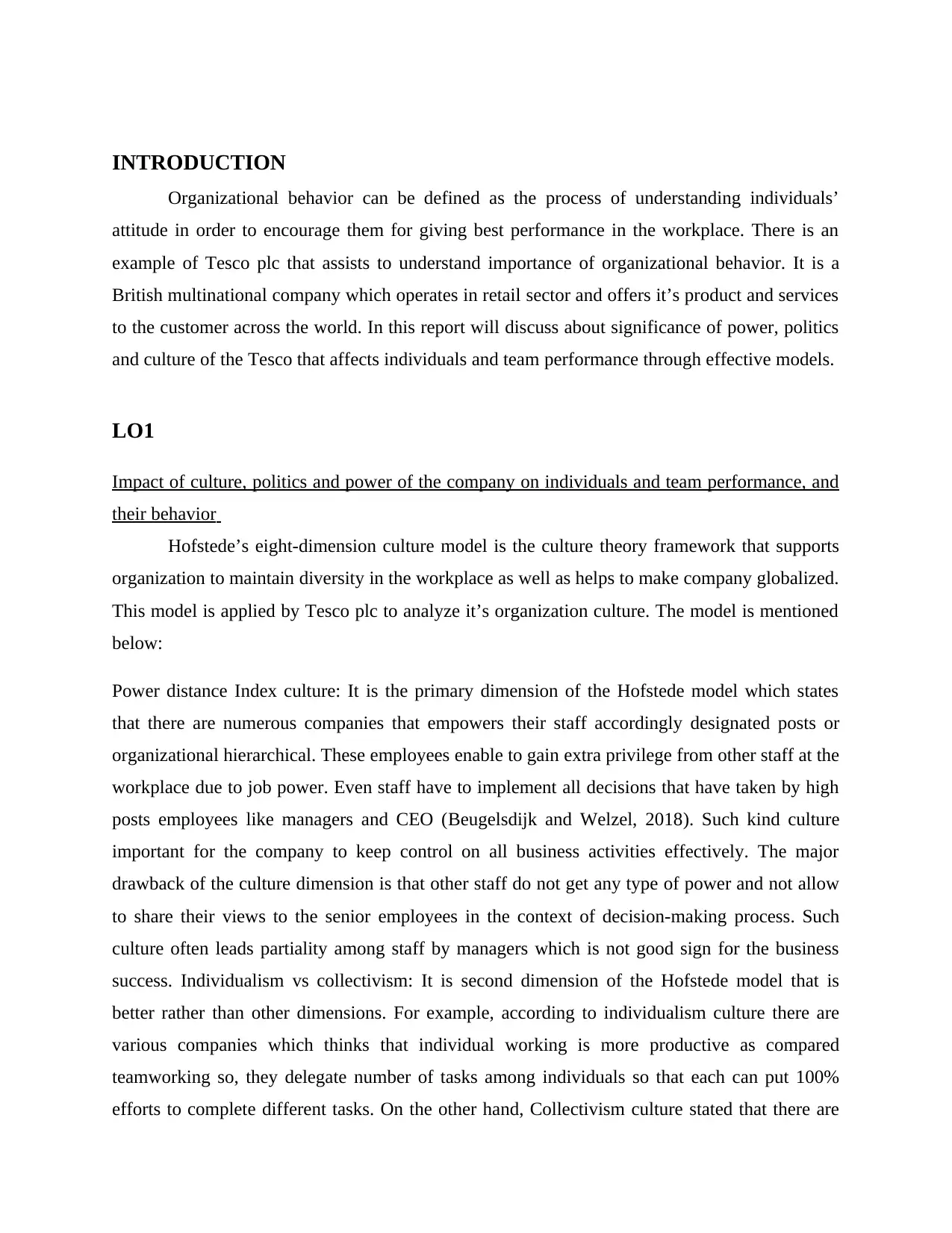
INTRODUCTION
Organizational behavior can be defined as the process of understanding individuals’
attitude in order to encourage them for giving best performance in the workplace. There is an
example of Tesco plc that assists to understand importance of organizational behavior. It is a
British multinational company which operates in retail sector and offers it’s product and services
to the customer across the world. In this report will discuss about significance of power, politics
and culture of the Tesco that affects individuals and team performance through effective models.
LO1
Impact of culture, politics and power of the company on individuals and team performance, and
their behavior
Hofstede’s eight-dimension culture model is the culture theory framework that supports
organization to maintain diversity in the workplace as well as helps to make company globalized.
This model is applied by Tesco plc to analyze it’s organization culture. The model is mentioned
below:
Power distance Index culture: It is the primary dimension of the Hofstede model which states
that there are numerous companies that empowers their staff accordingly designated posts or
organizational hierarchical. These employees enable to gain extra privilege from other staff at the
workplace due to job power. Even staff have to implement all decisions that have taken by high
posts employees like managers and CEO (Beugelsdijk and Welzel, 2018). Such kind culture
important for the company to keep control on all business activities effectively. The major
drawback of the culture dimension is that other staff do not get any type of power and not allow
to share their views to the senior employees in the context of decision-making process. Such
culture often leads partiality among staff by managers which is not good sign for the business
success. Individualism vs collectivism: It is second dimension of the Hofstede model that is
better rather than other dimensions. For example, according to individualism culture there are
various companies which thinks that individual working is more productive as compared
teamworking so, they delegate number of tasks among individuals so that each can put 100%
efforts to complete different tasks. On the other hand, Collectivism culture stated that there are
Organizational behavior can be defined as the process of understanding individuals’
attitude in order to encourage them for giving best performance in the workplace. There is an
example of Tesco plc that assists to understand importance of organizational behavior. It is a
British multinational company which operates in retail sector and offers it’s product and services
to the customer across the world. In this report will discuss about significance of power, politics
and culture of the Tesco that affects individuals and team performance through effective models.
LO1
Impact of culture, politics and power of the company on individuals and team performance, and
their behavior
Hofstede’s eight-dimension culture model is the culture theory framework that supports
organization to maintain diversity in the workplace as well as helps to make company globalized.
This model is applied by Tesco plc to analyze it’s organization culture. The model is mentioned
below:
Power distance Index culture: It is the primary dimension of the Hofstede model which states
that there are numerous companies that empowers their staff accordingly designated posts or
organizational hierarchical. These employees enable to gain extra privilege from other staff at the
workplace due to job power. Even staff have to implement all decisions that have taken by high
posts employees like managers and CEO (Beugelsdijk and Welzel, 2018). Such kind culture
important for the company to keep control on all business activities effectively. The major
drawback of the culture dimension is that other staff do not get any type of power and not allow
to share their views to the senior employees in the context of decision-making process. Such
culture often leads partiality among staff by managers which is not good sign for the business
success. Individualism vs collectivism: It is second dimension of the Hofstede model that is
better rather than other dimensions. For example, according to individualism culture there are
various companies which thinks that individual working is more productive as compared
teamworking so, they delegate number of tasks among individuals so that each can put 100%
efforts to complete different tasks. On the other hand, Collectivism culture stated that there are
⊘ This is a preview!⊘
Do you want full access?
Subscribe today to unlock all pages.

Trusted by 1+ million students worldwide
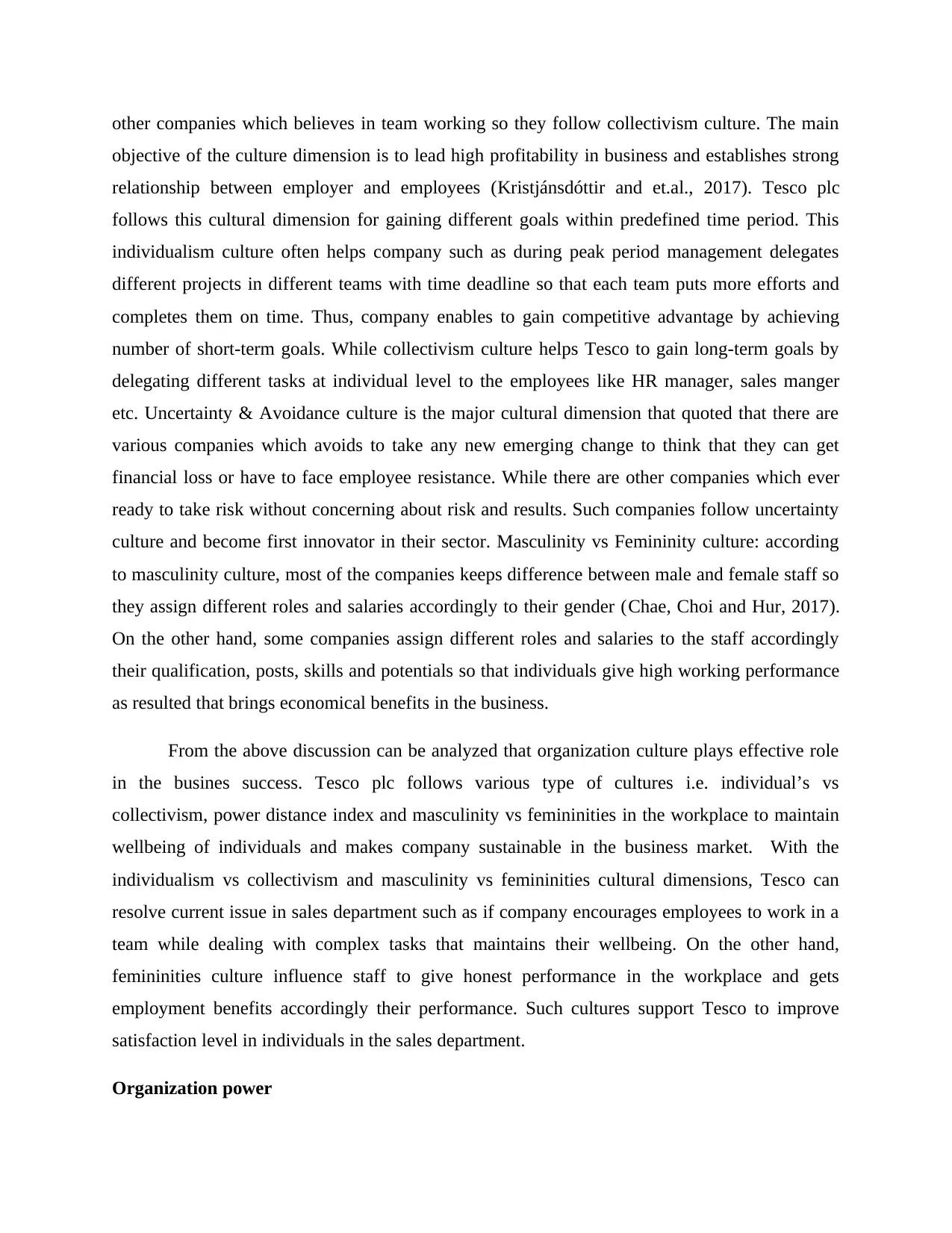
other companies which believes in team working so they follow collectivism culture. The main
objective of the culture dimension is to lead high profitability in business and establishes strong
relationship between employer and employees (Kristjánsdóttir and et.al., 2017). Tesco plc
follows this cultural dimension for gaining different goals within predefined time period. This
individualism culture often helps company such as during peak period management delegates
different projects in different teams with time deadline so that each team puts more efforts and
completes them on time. Thus, company enables to gain competitive advantage by achieving
number of short-term goals. While collectivism culture helps Tesco to gain long-term goals by
delegating different tasks at individual level to the employees like HR manager, sales manger
etc. Uncertainty & Avoidance culture is the major cultural dimension that quoted that there are
various companies which avoids to take any new emerging change to think that they can get
financial loss or have to face employee resistance. While there are other companies which ever
ready to take risk without concerning about risk and results. Such companies follow uncertainty
culture and become first innovator in their sector. Masculinity vs Femininity culture: according
to masculinity culture, most of the companies keeps difference between male and female staff so
they assign different roles and salaries accordingly to their gender (Chae, Choi and Hur, 2017).
On the other hand, some companies assign different roles and salaries to the staff accordingly
their qualification, posts, skills and potentials so that individuals give high working performance
as resulted that brings economical benefits in the business.
From the above discussion can be analyzed that organization culture plays effective role
in the busines success. Tesco plc follows various type of cultures i.e. individual’s vs
collectivism, power distance index and masculinity vs femininities in the workplace to maintain
wellbeing of individuals and makes company sustainable in the business market. With the
individualism vs collectivism and masculinity vs femininities cultural dimensions, Tesco can
resolve current issue in sales department such as if company encourages employees to work in a
team while dealing with complex tasks that maintains their wellbeing. On the other hand,
femininities culture influence staff to give honest performance in the workplace and gets
employment benefits accordingly their performance. Such cultures support Tesco to improve
satisfaction level in individuals in the sales department.
Organization power
objective of the culture dimension is to lead high profitability in business and establishes strong
relationship between employer and employees (Kristjánsdóttir and et.al., 2017). Tesco plc
follows this cultural dimension for gaining different goals within predefined time period. This
individualism culture often helps company such as during peak period management delegates
different projects in different teams with time deadline so that each team puts more efforts and
completes them on time. Thus, company enables to gain competitive advantage by achieving
number of short-term goals. While collectivism culture helps Tesco to gain long-term goals by
delegating different tasks at individual level to the employees like HR manager, sales manger
etc. Uncertainty & Avoidance culture is the major cultural dimension that quoted that there are
various companies which avoids to take any new emerging change to think that they can get
financial loss or have to face employee resistance. While there are other companies which ever
ready to take risk without concerning about risk and results. Such companies follow uncertainty
culture and become first innovator in their sector. Masculinity vs Femininity culture: according
to masculinity culture, most of the companies keeps difference between male and female staff so
they assign different roles and salaries accordingly to their gender (Chae, Choi and Hur, 2017).
On the other hand, some companies assign different roles and salaries to the staff accordingly
their qualification, posts, skills and potentials so that individuals give high working performance
as resulted that brings economical benefits in the business.
From the above discussion can be analyzed that organization culture plays effective role
in the busines success. Tesco plc follows various type of cultures i.e. individual’s vs
collectivism, power distance index and masculinity vs femininities in the workplace to maintain
wellbeing of individuals and makes company sustainable in the business market. With the
individualism vs collectivism and masculinity vs femininities cultural dimensions, Tesco can
resolve current issue in sales department such as if company encourages employees to work in a
team while dealing with complex tasks that maintains their wellbeing. On the other hand,
femininities culture influence staff to give honest performance in the workplace and gets
employment benefits accordingly their performance. Such cultures support Tesco to improve
satisfaction level in individuals in the sales department.
Organization power
Paraphrase This Document
Need a fresh take? Get an instant paraphrase of this document with our AI Paraphraser
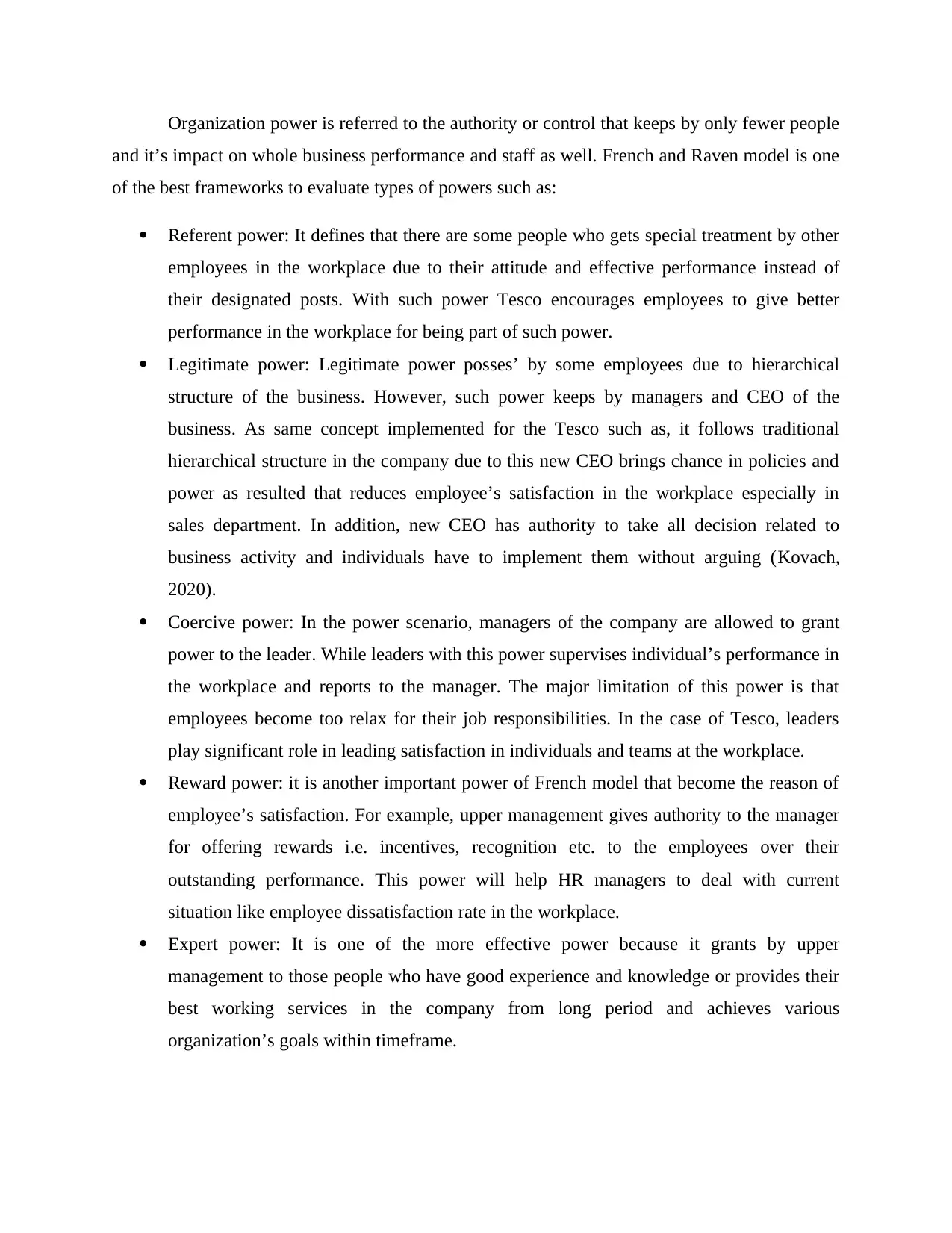
Organization power is referred to the authority or control that keeps by only fewer people
and it’s impact on whole business performance and staff as well. French and Raven model is one
of the best frameworks to evaluate types of powers such as:
Referent power: It defines that there are some people who gets special treatment by other
employees in the workplace due to their attitude and effective performance instead of
their designated posts. With such power Tesco encourages employees to give better
performance in the workplace for being part of such power.
Legitimate power: Legitimate power posses’ by some employees due to hierarchical
structure of the business. However, such power keeps by managers and CEO of the
business. As same concept implemented for the Tesco such as, it follows traditional
hierarchical structure in the company due to this new CEO brings chance in policies and
power as resulted that reduces employee’s satisfaction in the workplace especially in
sales department. In addition, new CEO has authority to take all decision related to
business activity and individuals have to implement them without arguing (Kovach,
2020).
Coercive power: In the power scenario, managers of the company are allowed to grant
power to the leader. While leaders with this power supervises individual’s performance in
the workplace and reports to the manager. The major limitation of this power is that
employees become too relax for their job responsibilities. In the case of Tesco, leaders
play significant role in leading satisfaction in individuals and teams at the workplace.
Reward power: it is another important power of French model that become the reason of
employee’s satisfaction. For example, upper management gives authority to the manager
for offering rewards i.e. incentives, recognition etc. to the employees over their
outstanding performance. This power will help HR managers to deal with current
situation like employee dissatisfaction rate in the workplace.
Expert power: It is one of the more effective power because it grants by upper
management to those people who have good experience and knowledge or provides their
best working services in the company from long period and achieves various
organization’s goals within timeframe.
and it’s impact on whole business performance and staff as well. French and Raven model is one
of the best frameworks to evaluate types of powers such as:
Referent power: It defines that there are some people who gets special treatment by other
employees in the workplace due to their attitude and effective performance instead of
their designated posts. With such power Tesco encourages employees to give better
performance in the workplace for being part of such power.
Legitimate power: Legitimate power posses’ by some employees due to hierarchical
structure of the business. However, such power keeps by managers and CEO of the
business. As same concept implemented for the Tesco such as, it follows traditional
hierarchical structure in the company due to this new CEO brings chance in policies and
power as resulted that reduces employee’s satisfaction in the workplace especially in
sales department. In addition, new CEO has authority to take all decision related to
business activity and individuals have to implement them without arguing (Kovach,
2020).
Coercive power: In the power scenario, managers of the company are allowed to grant
power to the leader. While leaders with this power supervises individual’s performance in
the workplace and reports to the manager. The major limitation of this power is that
employees become too relax for their job responsibilities. In the case of Tesco, leaders
play significant role in leading satisfaction in individuals and teams at the workplace.
Reward power: it is another important power of French model that become the reason of
employee’s satisfaction. For example, upper management gives authority to the manager
for offering rewards i.e. incentives, recognition etc. to the employees over their
outstanding performance. This power will help HR managers to deal with current
situation like employee dissatisfaction rate in the workplace.
Expert power: It is one of the more effective power because it grants by upper
management to those people who have good experience and knowledge or provides their
best working services in the company from long period and achieves various
organization’s goals within timeframe.
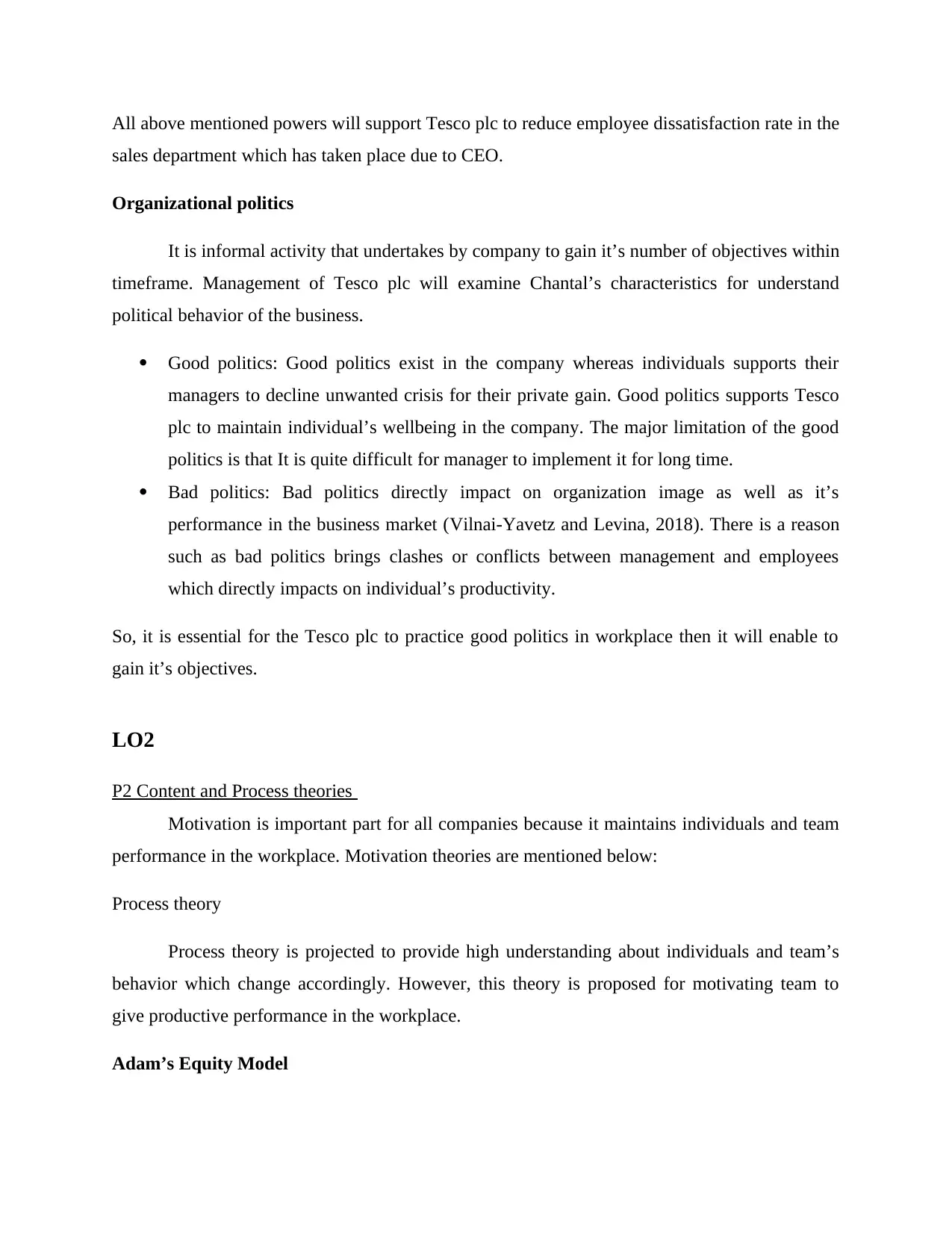
All above mentioned powers will support Tesco plc to reduce employee dissatisfaction rate in the
sales department which has taken place due to CEO.
Organizational politics
It is informal activity that undertakes by company to gain it’s number of objectives within
timeframe. Management of Tesco plc will examine Chantal’s characteristics for understand
political behavior of the business.
Good politics: Good politics exist in the company whereas individuals supports their
managers to decline unwanted crisis for their private gain. Good politics supports Tesco
plc to maintain individual’s wellbeing in the company. The major limitation of the good
politics is that It is quite difficult for manager to implement it for long time.
Bad politics: Bad politics directly impact on organization image as well as it’s
performance in the business market (Vilnai-Yavetz and Levina, 2018). There is a reason
such as bad politics brings clashes or conflicts between management and employees
which directly impacts on individual’s productivity.
So, it is essential for the Tesco plc to practice good politics in workplace then it will enable to
gain it’s objectives.
LO2
P2 Content and Process theories
Motivation is important part for all companies because it maintains individuals and team
performance in the workplace. Motivation theories are mentioned below:
Process theory
Process theory is projected to provide high understanding about individuals and team’s
behavior which change accordingly. However, this theory is proposed for motivating team to
give productive performance in the workplace.
Adam’s Equity Model
sales department which has taken place due to CEO.
Organizational politics
It is informal activity that undertakes by company to gain it’s number of objectives within
timeframe. Management of Tesco plc will examine Chantal’s characteristics for understand
political behavior of the business.
Good politics: Good politics exist in the company whereas individuals supports their
managers to decline unwanted crisis for their private gain. Good politics supports Tesco
plc to maintain individual’s wellbeing in the company. The major limitation of the good
politics is that It is quite difficult for manager to implement it for long time.
Bad politics: Bad politics directly impact on organization image as well as it’s
performance in the business market (Vilnai-Yavetz and Levina, 2018). There is a reason
such as bad politics brings clashes or conflicts between management and employees
which directly impacts on individual’s productivity.
So, it is essential for the Tesco plc to practice good politics in workplace then it will enable to
gain it’s objectives.
LO2
P2 Content and Process theories
Motivation is important part for all companies because it maintains individuals and team
performance in the workplace. Motivation theories are mentioned below:
Process theory
Process theory is projected to provide high understanding about individuals and team’s
behavior which change accordingly. However, this theory is proposed for motivating team to
give productive performance in the workplace.
Adam’s Equity Model
⊘ This is a preview!⊘
Do you want full access?
Subscribe today to unlock all pages.

Trusted by 1+ million students worldwide
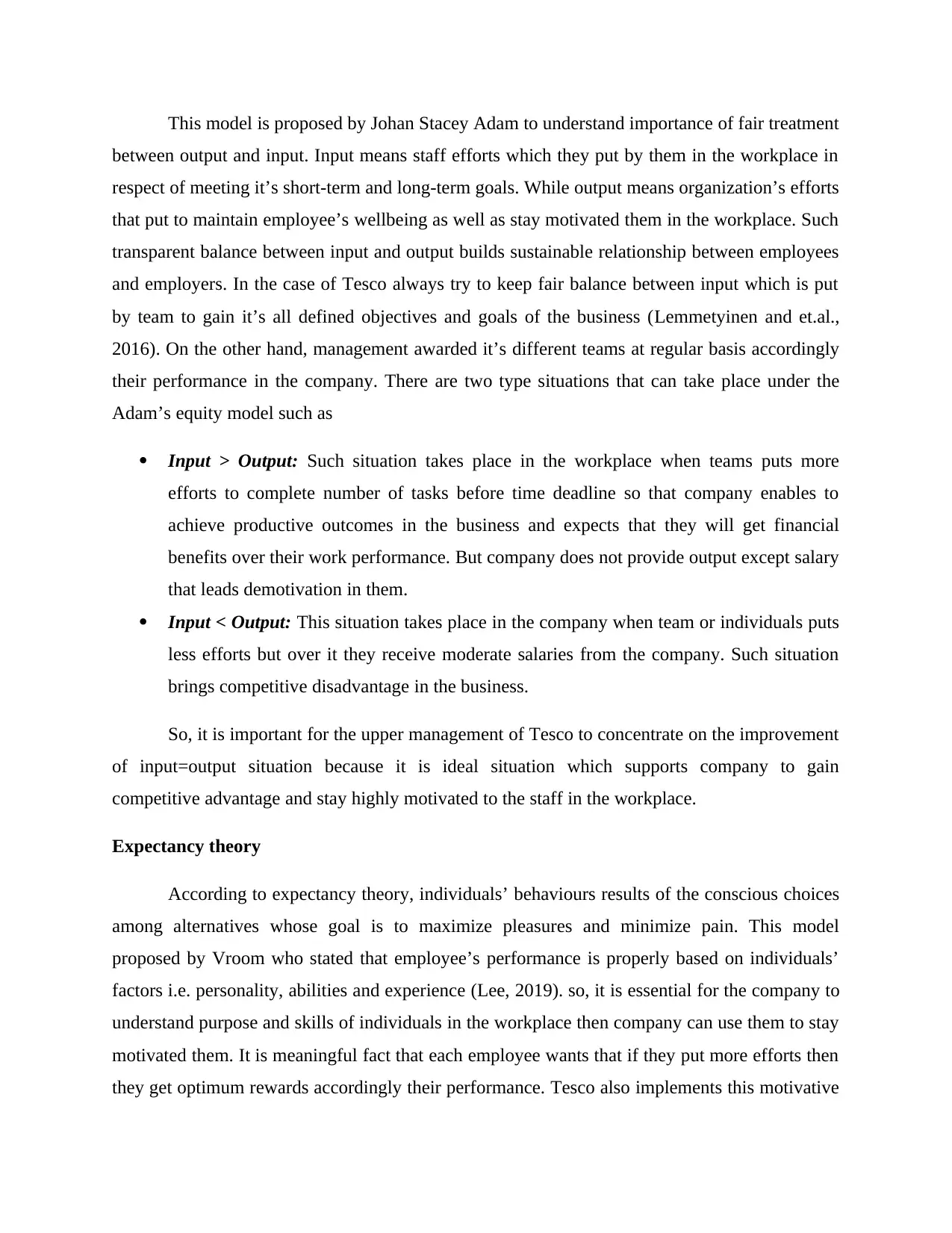
This model is proposed by Johan Stacey Adam to understand importance of fair treatment
between output and input. Input means staff efforts which they put by them in the workplace in
respect of meeting it’s short-term and long-term goals. While output means organization’s efforts
that put to maintain employee’s wellbeing as well as stay motivated them in the workplace. Such
transparent balance between input and output builds sustainable relationship between employees
and employers. In the case of Tesco always try to keep fair balance between input which is put
by team to gain it’s all defined objectives and goals of the business (Lemmetyinen and et.al.,
2016). On the other hand, management awarded it’s different teams at regular basis accordingly
their performance in the company. There are two type situations that can take place under the
Adam’s equity model such as
Input > Output: Such situation takes place in the workplace when teams puts more
efforts to complete number of tasks before time deadline so that company enables to
achieve productive outcomes in the business and expects that they will get financial
benefits over their work performance. But company does not provide output except salary
that leads demotivation in them.
Input < Output: This situation takes place in the company when team or individuals puts
less efforts but over it they receive moderate salaries from the company. Such situation
brings competitive disadvantage in the business.
So, it is important for the upper management of Tesco to concentrate on the improvement
of input=output situation because it is ideal situation which supports company to gain
competitive advantage and stay highly motivated to the staff in the workplace.
Expectancy theory
According to expectancy theory, individuals’ behaviours results of the conscious choices
among alternatives whose goal is to maximize pleasures and minimize pain. This model
proposed by Vroom who stated that employee’s performance is properly based on individuals’
factors i.e. personality, abilities and experience (Lee, 2019). so, it is essential for the company to
understand purpose and skills of individuals in the workplace then company can use them to stay
motivated them. It is meaningful fact that each employee wants that if they put more efforts then
they get optimum rewards accordingly their performance. Tesco also implements this motivative
between output and input. Input means staff efforts which they put by them in the workplace in
respect of meeting it’s short-term and long-term goals. While output means organization’s efforts
that put to maintain employee’s wellbeing as well as stay motivated them in the workplace. Such
transparent balance between input and output builds sustainable relationship between employees
and employers. In the case of Tesco always try to keep fair balance between input which is put
by team to gain it’s all defined objectives and goals of the business (Lemmetyinen and et.al.,
2016). On the other hand, management awarded it’s different teams at regular basis accordingly
their performance in the company. There are two type situations that can take place under the
Adam’s equity model such as
Input > Output: Such situation takes place in the workplace when teams puts more
efforts to complete number of tasks before time deadline so that company enables to
achieve productive outcomes in the business and expects that they will get financial
benefits over their work performance. But company does not provide output except salary
that leads demotivation in them.
Input < Output: This situation takes place in the company when team or individuals puts
less efforts but over it they receive moderate salaries from the company. Such situation
brings competitive disadvantage in the business.
So, it is important for the upper management of Tesco to concentrate on the improvement
of input=output situation because it is ideal situation which supports company to gain
competitive advantage and stay highly motivated to the staff in the workplace.
Expectancy theory
According to expectancy theory, individuals’ behaviours results of the conscious choices
among alternatives whose goal is to maximize pleasures and minimize pain. This model
proposed by Vroom who stated that employee’s performance is properly based on individuals’
factors i.e. personality, abilities and experience (Lee, 2019). so, it is essential for the company to
understand purpose and skills of individuals in the workplace then company can use them to stay
motivated them. It is meaningful fact that each employee wants that if they put more efforts then
they get optimum rewards accordingly their performance. Tesco also implements this motivative
Paraphrase This Document
Need a fresh take? Get an instant paraphrase of this document with our AI Paraphraser
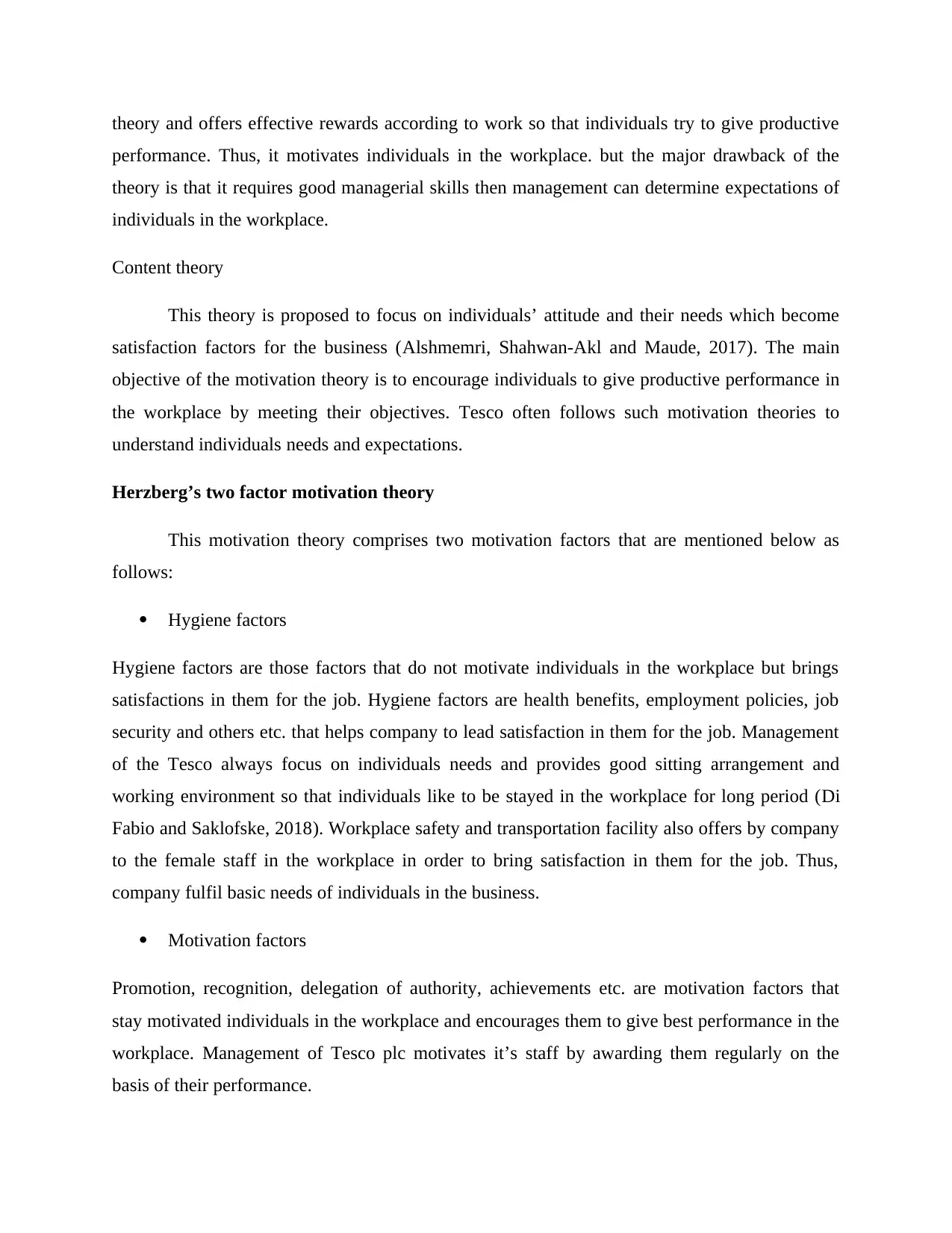
theory and offers effective rewards according to work so that individuals try to give productive
performance. Thus, it motivates individuals in the workplace. but the major drawback of the
theory is that it requires good managerial skills then management can determine expectations of
individuals in the workplace.
Content theory
This theory is proposed to focus on individuals’ attitude and their needs which become
satisfaction factors for the business (Alshmemri, Shahwan-Akl and Maude, 2017). The main
objective of the motivation theory is to encourage individuals to give productive performance in
the workplace by meeting their objectives. Tesco often follows such motivation theories to
understand individuals needs and expectations.
Herzberg’s two factor motivation theory
This motivation theory comprises two motivation factors that are mentioned below as
follows:
Hygiene factors
Hygiene factors are those factors that do not motivate individuals in the workplace but brings
satisfactions in them for the job. Hygiene factors are health benefits, employment policies, job
security and others etc. that helps company to lead satisfaction in them for the job. Management
of the Tesco always focus on individuals needs and provides good sitting arrangement and
working environment so that individuals like to be stayed in the workplace for long period (Di
Fabio and Saklofske, 2018). Workplace safety and transportation facility also offers by company
to the female staff in the workplace in order to bring satisfaction in them for the job. Thus,
company fulfil basic needs of individuals in the business.
Motivation factors
Promotion, recognition, delegation of authority, achievements etc. are motivation factors that
stay motivated individuals in the workplace and encourages them to give best performance in the
workplace. Management of Tesco plc motivates it’s staff by awarding them regularly on the
basis of their performance.
performance. Thus, it motivates individuals in the workplace. but the major drawback of the
theory is that it requires good managerial skills then management can determine expectations of
individuals in the workplace.
Content theory
This theory is proposed to focus on individuals’ attitude and their needs which become
satisfaction factors for the business (Alshmemri, Shahwan-Akl and Maude, 2017). The main
objective of the motivation theory is to encourage individuals to give productive performance in
the workplace by meeting their objectives. Tesco often follows such motivation theories to
understand individuals needs and expectations.
Herzberg’s two factor motivation theory
This motivation theory comprises two motivation factors that are mentioned below as
follows:
Hygiene factors
Hygiene factors are those factors that do not motivate individuals in the workplace but brings
satisfactions in them for the job. Hygiene factors are health benefits, employment policies, job
security and others etc. that helps company to lead satisfaction in them for the job. Management
of the Tesco always focus on individuals needs and provides good sitting arrangement and
working environment so that individuals like to be stayed in the workplace for long period (Di
Fabio and Saklofske, 2018). Workplace safety and transportation facility also offers by company
to the female staff in the workplace in order to bring satisfaction in them for the job. Thus,
company fulfil basic needs of individuals in the business.
Motivation factors
Promotion, recognition, delegation of authority, achievements etc. are motivation factors that
stay motivated individuals in the workplace and encourages them to give best performance in the
workplace. Management of Tesco plc motivates it’s staff by awarding them regularly on the
basis of their performance.
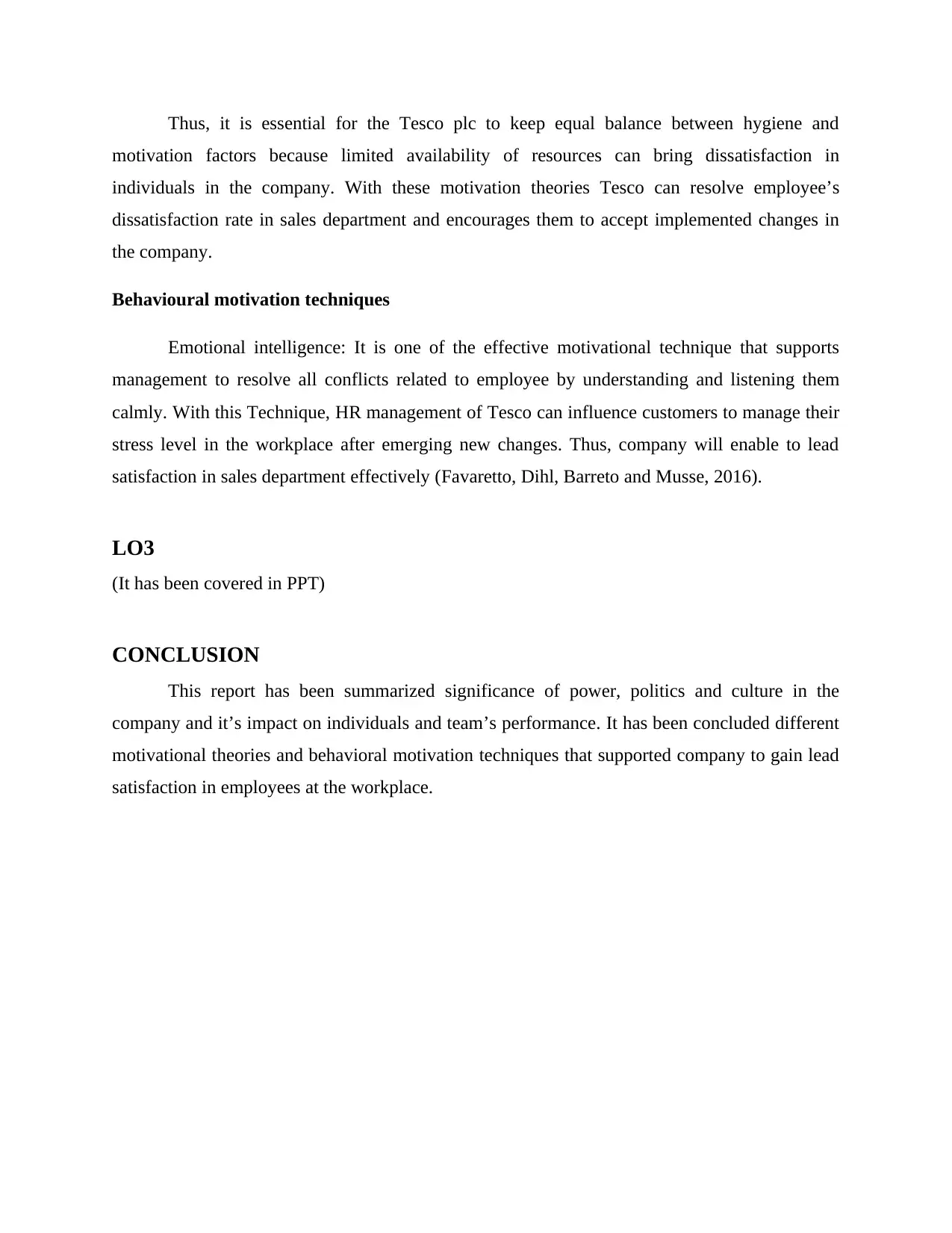
Thus, it is essential for the Tesco plc to keep equal balance between hygiene and
motivation factors because limited availability of resources can bring dissatisfaction in
individuals in the company. With these motivation theories Tesco can resolve employee’s
dissatisfaction rate in sales department and encourages them to accept implemented changes in
the company.
Behavioural motivation techniques
Emotional intelligence: It is one of the effective motivational technique that supports
management to resolve all conflicts related to employee by understanding and listening them
calmly. With this Technique, HR management of Tesco can influence customers to manage their
stress level in the workplace after emerging new changes. Thus, company will enable to lead
satisfaction in sales department effectively (Favaretto, Dihl, Barreto and Musse, 2016).
LO3
(It has been covered in PPT)
CONCLUSION
This report has been summarized significance of power, politics and culture in the
company and it’s impact on individuals and team’s performance. It has been concluded different
motivational theories and behavioral motivation techniques that supported company to gain lead
satisfaction in employees at the workplace.
motivation factors because limited availability of resources can bring dissatisfaction in
individuals in the company. With these motivation theories Tesco can resolve employee’s
dissatisfaction rate in sales department and encourages them to accept implemented changes in
the company.
Behavioural motivation techniques
Emotional intelligence: It is one of the effective motivational technique that supports
management to resolve all conflicts related to employee by understanding and listening them
calmly. With this Technique, HR management of Tesco can influence customers to manage their
stress level in the workplace after emerging new changes. Thus, company will enable to lead
satisfaction in sales department effectively (Favaretto, Dihl, Barreto and Musse, 2016).
LO3
(It has been covered in PPT)
CONCLUSION
This report has been summarized significance of power, politics and culture in the
company and it’s impact on individuals and team’s performance. It has been concluded different
motivational theories and behavioral motivation techniques that supported company to gain lead
satisfaction in employees at the workplace.
⊘ This is a preview!⊘
Do you want full access?
Subscribe today to unlock all pages.

Trusted by 1+ million students worldwide
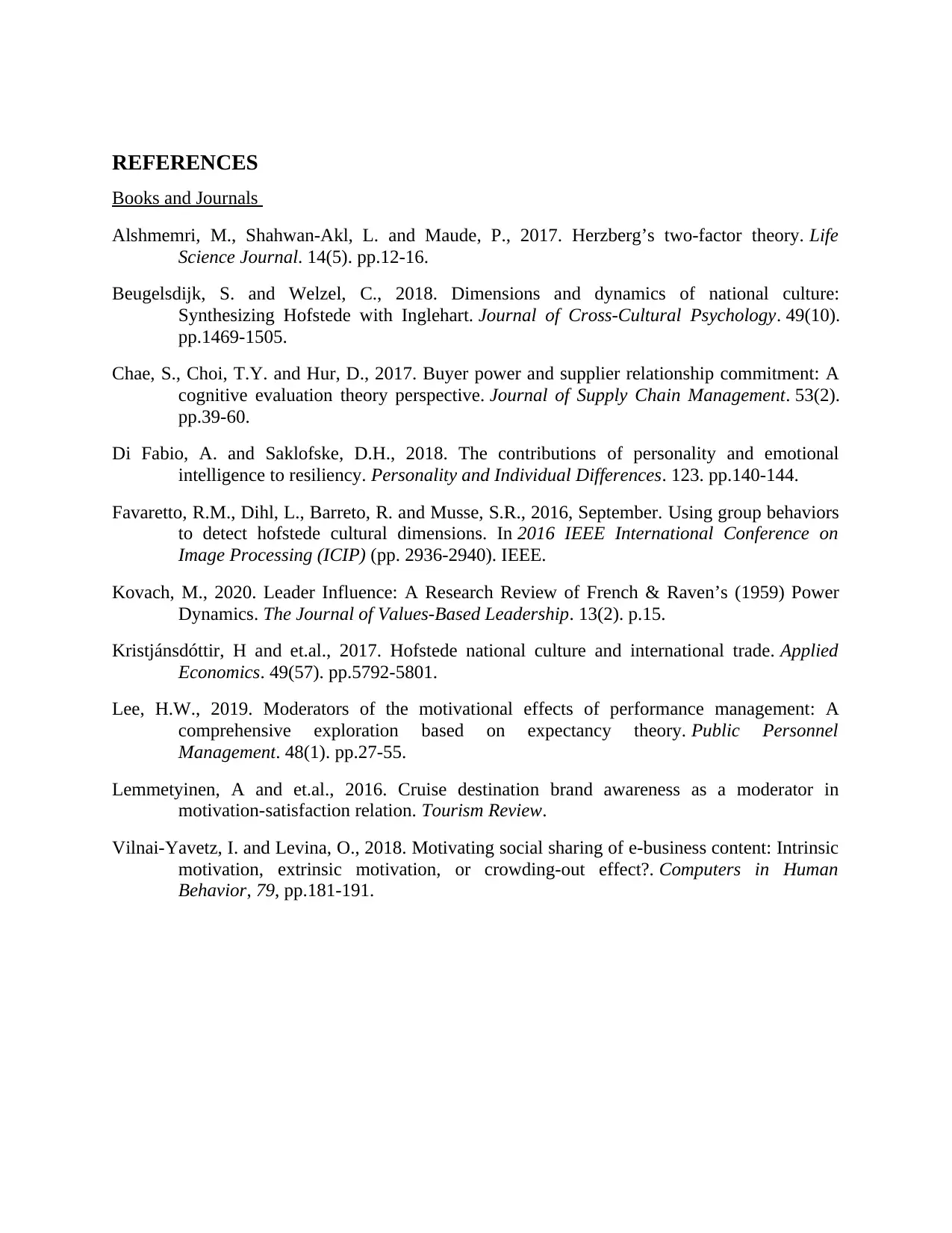
REFERENCES
Books and Journals
Alshmemri, M., Shahwan-Akl, L. and Maude, P., 2017. Herzberg’s two-factor theory. Life
Science Journal. 14(5). pp.12-16.
Beugelsdijk, S. and Welzel, C., 2018. Dimensions and dynamics of national culture:
Synthesizing Hofstede with Inglehart. Journal of Cross-Cultural Psychology. 49(10).
pp.1469-1505.
Chae, S., Choi, T.Y. and Hur, D., 2017. Buyer power and supplier relationship commitment: A
cognitive evaluation theory perspective. Journal of Supply Chain Management. 53(2).
pp.39-60.
Di Fabio, A. and Saklofske, D.H., 2018. The contributions of personality and emotional
intelligence to resiliency. Personality and Individual Differences. 123. pp.140-144.
Favaretto, R.M., Dihl, L., Barreto, R. and Musse, S.R., 2016, September. Using group behaviors
to detect hofstede cultural dimensions. In 2016 IEEE International Conference on
Image Processing (ICIP) (pp. 2936-2940). IEEE.
Kovach, M., 2020. Leader Influence: A Research Review of French & Raven’s (1959) Power
Dynamics. The Journal of Values-Based Leadership. 13(2). p.15.
Kristjánsdóttir, H and et.al., 2017. Hofstede national culture and international trade. Applied
Economics. 49(57). pp.5792-5801.
Lee, H.W., 2019. Moderators of the motivational effects of performance management: A
comprehensive exploration based on expectancy theory. Public Personnel
Management. 48(1). pp.27-55.
Lemmetyinen, A and et.al., 2016. Cruise destination brand awareness as a moderator in
motivation-satisfaction relation. Tourism Review.
Vilnai-Yavetz, I. and Levina, O., 2018. Motivating social sharing of e-business content: Intrinsic
motivation, extrinsic motivation, or crowding-out effect?. Computers in Human
Behavior, 79, pp.181-191.
Books and Journals
Alshmemri, M., Shahwan-Akl, L. and Maude, P., 2017. Herzberg’s two-factor theory. Life
Science Journal. 14(5). pp.12-16.
Beugelsdijk, S. and Welzel, C., 2018. Dimensions and dynamics of national culture:
Synthesizing Hofstede with Inglehart. Journal of Cross-Cultural Psychology. 49(10).
pp.1469-1505.
Chae, S., Choi, T.Y. and Hur, D., 2017. Buyer power and supplier relationship commitment: A
cognitive evaluation theory perspective. Journal of Supply Chain Management. 53(2).
pp.39-60.
Di Fabio, A. and Saklofske, D.H., 2018. The contributions of personality and emotional
intelligence to resiliency. Personality and Individual Differences. 123. pp.140-144.
Favaretto, R.M., Dihl, L., Barreto, R. and Musse, S.R., 2016, September. Using group behaviors
to detect hofstede cultural dimensions. In 2016 IEEE International Conference on
Image Processing (ICIP) (pp. 2936-2940). IEEE.
Kovach, M., 2020. Leader Influence: A Research Review of French & Raven’s (1959) Power
Dynamics. The Journal of Values-Based Leadership. 13(2). p.15.
Kristjánsdóttir, H and et.al., 2017. Hofstede national culture and international trade. Applied
Economics. 49(57). pp.5792-5801.
Lee, H.W., 2019. Moderators of the motivational effects of performance management: A
comprehensive exploration based on expectancy theory. Public Personnel
Management. 48(1). pp.27-55.
Lemmetyinen, A and et.al., 2016. Cruise destination brand awareness as a moderator in
motivation-satisfaction relation. Tourism Review.
Vilnai-Yavetz, I. and Levina, O., 2018. Motivating social sharing of e-business content: Intrinsic
motivation, extrinsic motivation, or crowding-out effect?. Computers in Human
Behavior, 79, pp.181-191.
1 out of 10
Related Documents
Your All-in-One AI-Powered Toolkit for Academic Success.
+13062052269
info@desklib.com
Available 24*7 on WhatsApp / Email
![[object Object]](/_next/static/media/star-bottom.7253800d.svg)
Unlock your academic potential
Copyright © 2020–2026 A2Z Services. All Rights Reserved. Developed and managed by ZUCOL.



